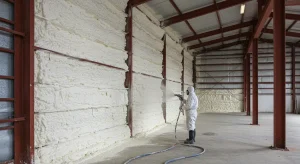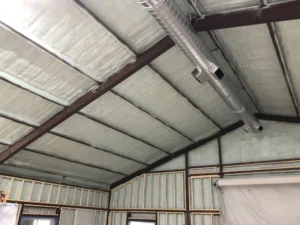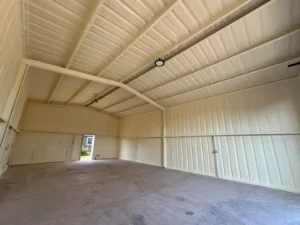Spray foam insulation is a powerful solution for improving energy efficiency, air quality, and structural integrity in commercial buildings. Its expanding properties allow it to seal gaps and cracks, reducing energy loss and moisture intrusion. Whether applied to walls, ceilings, or specialized areas, spray foam delivers long-term benefits for businesses looking to optimize their buildings.
This guide explores the best places to use spray foam insulation in commercial structures, providing practical insights into how and where it enhances performance.
Key Areas for Spray Foam Insulation
1. Roofing Systems
A well-insulated roof is essential for temperature regulation and energy savings. Spray foam creates a seamless barrier that prevents air leakage, resists water infiltration, and strengthens the roof structure. It works particularly well for:
- Flat and low-slope roofs
- Metal and concrete deck roofing
- Retrofit projects where traditional insulation methods are difficult to install
2. Exterior Walls
Walls are a major point of energy loss in commercial buildings. Spray foam insulation fills voids, preventing drafts and condensation issues. This application is ideal for:
- Metal buildings requiring enhanced thermal resistance
- Multi-story structures where air leaks between floors
- Buildings in extreme climates needing better insulation performance
3. Interior Walls and Partitions
Soundproofing and thermal control between rooms are critical in commercial settings. Spray foam is commonly used for:
- Office partitions to reduce noise transfer
- Storage rooms requiring temperature stability
- Hospitality spaces where privacy and comfort matter
4. Basements and Crawl Spaces
Underground areas are prone to moisture buildup, which can lead to mold and structural damage. Spray foam provides:
- Moisture resistance to prevent dampness and mold growth
- Improved air quality by sealing out pollutants and allergens
- Added structural support to foundation walls
5. Mechanical and Utility Rooms
Maintaining controlled environments for electrical and HVAC systems ensures their efficiency and longevity. Spray foam is useful in:
- HVAC duct insulation to reduce energy loss
- Boiler and mechanical rooms to maintain stable temperatures
- Soundproofing noisy equipment areas
6. Doors, Windows, and Gaps
Air leaks around openings contribute to higher energy costs. Spray foam insulation can be applied to:
- Door and window perimeters for an airtight seal
- Expansion joints and penetrations in the building envelope
- Loading docks where frequent openings create temperature fluctuations
Boost Energy Savings with Professional Spray Foam Installation
Using high-quality spray foam insulation in the right places significantly lowers heating and cooling costs. Flatland Roofing & Insulation specializes in commercial spray foam applications tailored to your building’s needs. Call (806) 606-6794 or email info@flatlandroofcoatings.com for expert guidance.
Additional Considerations for Commercial Buildings
Moisture Control and Vapor Barriers
Spray foam insulation helps manage moisture, reducing the risk of mold growth and structural decay. It works as a vapor barrier when applied at the correct thickness, making it a valuable solution for humid climates or buildings with high moisture exposure.
Fire Resistance and Safety Compliance
Many commercial buildings must meet fire code regulations. Certain spray foam products are treated with fire retardants, making them suitable for compliance in various applications. Always verify that the selected spray foam meets local safety standards.
Retrofitting vs. New Construction
Spray foam is highly effective for both new construction and retrofitting older buildings. For renovations, closed-cell spray foam is often preferred due to its higher R-value and structural benefits. It adheres well to existing surfaces, making it an efficient choice for improving insulation without major modifications.
FAQs
Is spray foam insulation safe for commercial buildings?
Yes, spray foam insulation is safe when installed correctly. Professional installers ensure proper ventilation and curing time to prevent off-gassing concerns.
How long does spray foam insulation last?
Spray foam insulation can last for decades, often outlasting traditional insulation materials. It does not sag or deteriorate over time, maintaining its performance.
Can spray foam insulation reduce noise in commercial spaces?
Yes, open-cell spray foam provides excellent soundproofing, making it ideal for offices, hotels, and other commercial areas where noise control is needed.
Does spray foam insulation help with energy efficiency?
Absolutely. Spray foam reduces air leaks and improves thermal resistance, leading to lower heating and cooling costs.
What is the difference between open-cell and closed-cell spray foam?
Open-cell spray foam is softer, providing better sound absorption, while closed-cell foam is denser, offering higher insulation value and moisture resistance.
Can spray foam be applied over existing insulation?
It depends on the existing insulation type and condition. In many cases, old insulation may need to be removed for optimal spray foam application.
Does spray foam insulation add structural strength?
Yes, closed-cell spray foam enhances the strength of walls and roofs, improving their durability.
Is spray foam insulation environmentally friendly?
Many spray foam products are formulated with eco-friendly blowing agents and contribute to energy savings, reducing the building’s carbon footprint.
How much does spray foam insulation cost for a commercial building?
Costs vary based on the area covered, foam type, and building requirements. Contact a professional for a detailed estimate.
How do I schedule an inspection for spray foam installation?
Reach out to Flatland Roofing & Insulation at (806) 606-6794 or info@flatlandroofcoatings.com to arrange an assessment of your commercial building.





